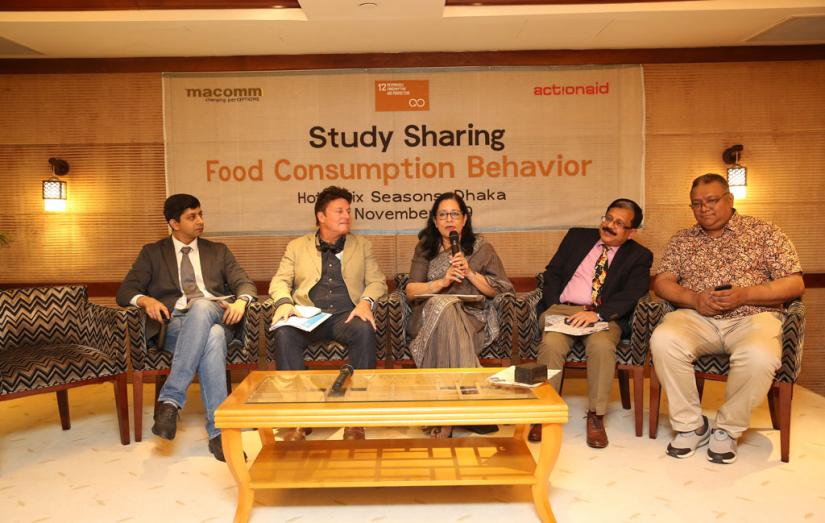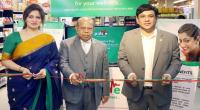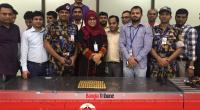 Most of the water waste is believed to have been taking place in Dhaka city during bathing and regular showers.
Most of the water waste is believed to have been taking place in Dhaka city during bathing and regular showers.
A majority of the respondents in a recent survey concluded that most of the water waste occurs during showers.
The study by ActionAid Bangladesh surveyed 1,500 residents in the capital's Bashundhara, Uttara, Mohammadpur, Dhanmondi, Gulshan, Banani, Baridhara and Old Dhaka.
Among the participants, 843 or 56.2% were male, while 657 or 43.8% were female.
The study aimed to understand the food consumption behaviour, shifting trends of food consumption patterns, expenditure analysis on food consumption, wastage in food consumption, sources and propensity.
ActionAid shared the study's findings with the media at a Dhaka hotel on Wednesday (Nov 13).
It said that the study found food waste happened mostly in weddings, eateries and restaurants as consumption pattern suggests increasing trends of eating-out on the back of a growing middle class and urbanisation in the country, while water waste is reported during washing clothes and taking showers.
Among the respondents, 91%, aged between 15 and 24, acknowledged that there has been an increasing pattern among younger people to eating out.
Over the past several years, people have increasingly started eating out, the media call was told.
A decade ago, Chinese and local fast food were popular destinations while eating out, but now the trend has shifted and expanded to a more diverse and international standard of food explorations and tea-coffee culture among the youth, according to the study.
Among the respondents, 44% acknowledged their interest in fast food while 27% preferred Chinese food, 14% Indian cuisine, 7% Thai, 4% Italian and 3% Japanese.
50% of respondents said that they eat out 2-4 times a month while 59% of respondents spend less than Tk 3000 per month while 26% spend Tk 3000-Tk 4000, 9% spend Tk 5000-Tk 6000 and 6% spend more than Tk 7000 per month to eat out.
88% people drink mineral water during eating out while 80% said that if any water is left in the bottle they retain the bottle to drink water sometime later.
52% of the respondents expressed their concern over food waste mostly taking place during wedding programs while 30% in restaurants and 16% at home.
Among 815 respondents, 92% admitted that they are aware of the health effects of overeating, while 71% respondents said that they have suffered due to overeating.
Dr S M Manjurul Hannan Khan, additional secretary, Ministry of Environment, Forest & Climate Change, said that family education and awareness campaigns are needed to prevent food waste.
He said: “Food packaging and use of plastic are polluting the environment and there will be more plastic than fish in our oceans and seas by the year 2050.”
He said that the government is planning to search for a better alternative of plastic in addition to the plastic ban.
Richard Ragan, Bangladesh representative of the World Food Programme, said that eating out has become a fashion and a form of entertainment.
He said: “Our food consumption habits has changed due to rapid globalization and the amount of food wastages are increasing day by day.”
Farah Kabir, country director of ActionAid Bangladesh, also spoke at the study sharing program.
 Others
Others
30765 hour(s) 58 minute(s) ago ;
Afternoon 04:53 ; Saturday ; Apr 20, 2024
Most water wasted during showers in Dhaka: Study
Send
Bangla Tribune Desk
Published : 02:00, Nov 14, 2019 | Updated : 02:00, Nov 14, 2019
Published : 02:00, Nov 14, 2019 | Updated : 02:00, Nov 14, 2019
0 ...0 ...
/hb/
Topics: Top Stories
- KOICA donates medical supplies to BSMMU
- 5 more flights to take back British nationals to London
- Covid19: Rajarbagh, Mohammadpur worst affected
- Momen joins UN solidarity song over COVID-19 combat
- Covid-19: OIC to hold special meeting
- WFP begins food distribution in Cox’s Bazar
- WFP begins food distribution in Cox’s Bazar
- 290 return home to Australia
- Third charter flight for US citizens to return home
- Dhaka proposes to postpone D8 Summit
Unauthorized use of news, image, information, etc published by Bangla Tribune is punishable by copyright law. Appropriate legal steps will be taken by the management against any person or body that infringes those laws.
Bangla Tribune is one of the most revered online newspapers in Bangladesh, due to its reputation of neutral coverage and incisive analysis.
F R Tower, 8/C Panthapath, Shukrabad, Dhaka-1207 | Phone: 58151324; 58151326, Fax: 58151329 | Mob: 01730794527, 01730794528


